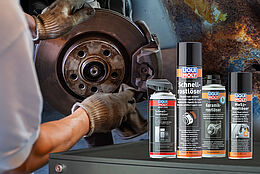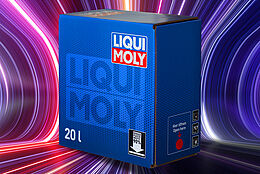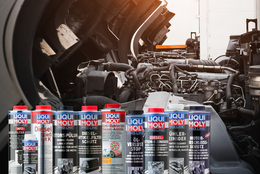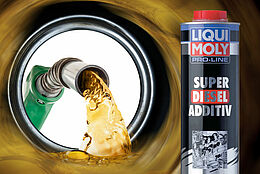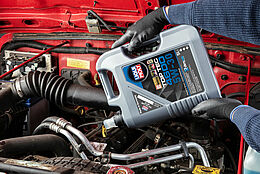- 6min
Cold spell: Protection against the freezing of commercial vehicles
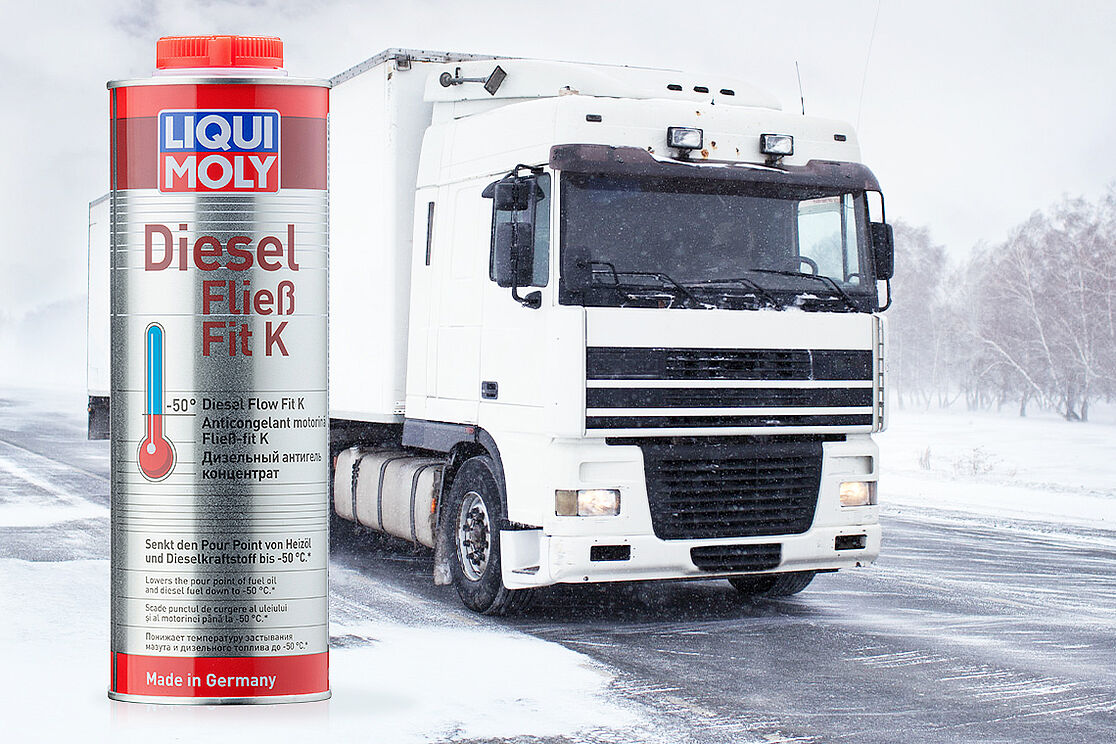
Paraffin - the source of the problem
Why does diesel clog or lose its capacity to flow? The source of the problem is paraffin, a wax found in diesel. This fluid wax solidifies in cold weather. It crystallizes, and the crystals block the fuel filter. Then the engine stops receiving fuel and comes to a standstill. Even though the diesel sold in winter is less affected by the cold: if winter diesel is not available or if there is a really extreme drop in temperature – as is currently forecast – Diesel Flow Fit stops the diesel from clogging.
It is a concentrate that provides anti-clog protection, depending on the quality of the diesel fuel. And it works up to temperatures of minus 31 degrees Celsius. Simply add a can directly before fueling: this is the most effective way to ensure the additive mixes with the diesel fuel. A flow improver is very useful for diesel vehicles that are left to stand outdoors. It is also a good way to prepare for a skiing trip: after all, fuel quality can vary considerably in other countries.
Important: Fill the tank before it starts freezing!
It is important to add Diesel Flow Fit before the diesel starts to clog. If it’s too late, the only way to liquefy the paraffin crystals again is through warmth. So add Diesel Flow Fit to your fuel tank right away – and you’ll be all set for the cold spell.

“No experiments. Prevention protects you from consequential damage.”
Old-fashioned household remedies such as petroleum or benzine can cause major, expensive damage when added to diesel fuel, warns Harry Hartkorn. As Team Leader Applications Technology with LIQUI MOLY, he recommends using professional flow improvers to make diesel fuel resilient to the cold.
When should a diesel winter additive be used or carried on board?
That depends very much on the weather and where you’re going. Anyone going on a skiing holiday and traveling from a milder region should take along a flow improver such as LIQUI MOLY’s Diesel Flow Fit, for example. This also applies to those who use their vehicle a lot for work and travel to places where temperatures are considerably lower. Anyone heading off on long trips to other countries should be especially well prepared: while transition diesel or even winter-grade diesel is now available in Germany, only summer-grade diesel is available in southern Italy and Spain, for instance. This can result in unpleasant surprises when heading north for the return journey to what will usually be colder weather back home.
How can you assess the quality of diesel fuel at a gas station when you’re away from home?
It’s impossible to determine the quality of diesel fuel without conducting lab tests. So both non-experts and specialists simply have to trust that the fuel quality shown on the pump is correct.
What different diesel fuels exist and how do they differ?
There are three qualities in Germany. By law, summer-grade diesel may only be sold up until the end of September. Here the so-called Cold Filter Plugging Point or CFPP is 0 degrees Celsius. From October to mid-November so-called transition diesel is available with a CFPP of -10 degrees Celsius. From mid-November to the end of February, winter-grade diesel should be available at all gas stations in Germany. This has a CFPP of -20 degrees Celsius. Transition diesel is once again available at pumps from the beginning of March through to mid-April. In some areas of Europe, including Scandinavia, polar diesel is also available for extreme weather conditions – this is itself is subdivided into five categories.
The CFPP at which a test filter clogs up under defined conditions is much lower for winter-grade diesel than summer-grade diesel. The measurement methods are defined in the EN 590 standard, which applies in all EU countries as well as in Iceland, Norway and Switzerland.
Which vehicles are most at risk getting a clogged fuel filter?
Vehicles cool down much more if they are parked outdoors than if they are kept in a garage. Headwind reduces the temperature too, which is why we recommend early use of an additive. Once the paraffin flocculates, the flow improver is no use any more. At this point, warmth and patience are required for the vehicle to slowly “defrost”. But it ought to be possible to avoid waiting times like this.
What else is important?
Diesel Flow Fit may not be stored at temperatures below 0 degrees Celsius – i.e. avoid storing it outdoors, in truck storage boxes, in unheated warehouses or in garages. When it is applied, it should be at room temperature and the temperature of the diesel fuel shouldn’t be below freezing. Providing the specified conditions are observed, our additives can be stored for a maximum of five years.
Can an overdose of additive cause damage?
Use of the additive is harmless even if the dose is twice the specified amount. But using more isn’t any more effective. The additive has a one-off effect – this can’t be enhanced by using even more. So there’s no point in increasing the dosage.
How is it possible to avoid such damage?
Since there is a huge scope for an overdose, any such damage is highly improbable. We are not aware of anything like this having happened.
Major, expensive damage can be caused by old-fashioned household remedies such as petroleum or benzine. If these are added to diesel there is no longer a sufficient guarantee that the high-pressure pump and other highly sensitive components of the entire injection system will be lubricated. Nobody should tempted to experiment. Modern engines in particular are very unforgiving in this respect.



